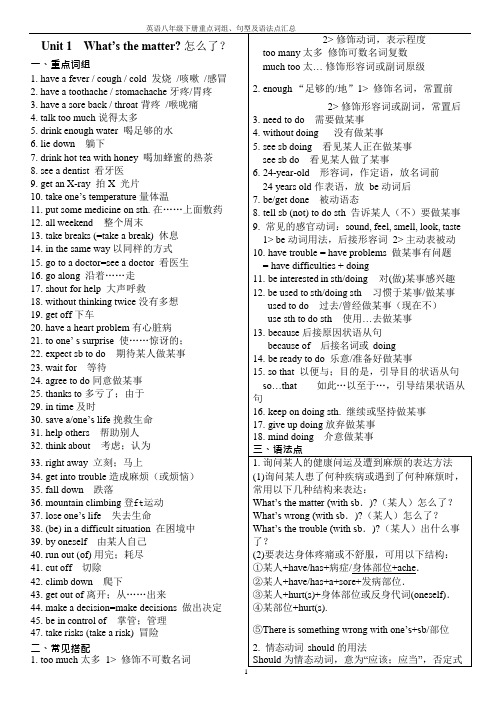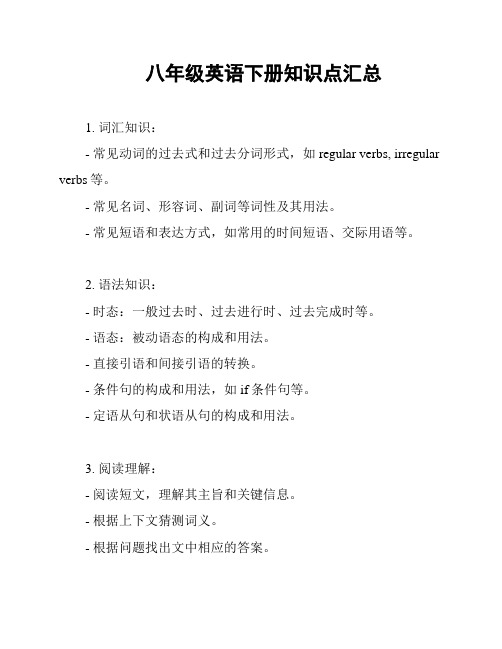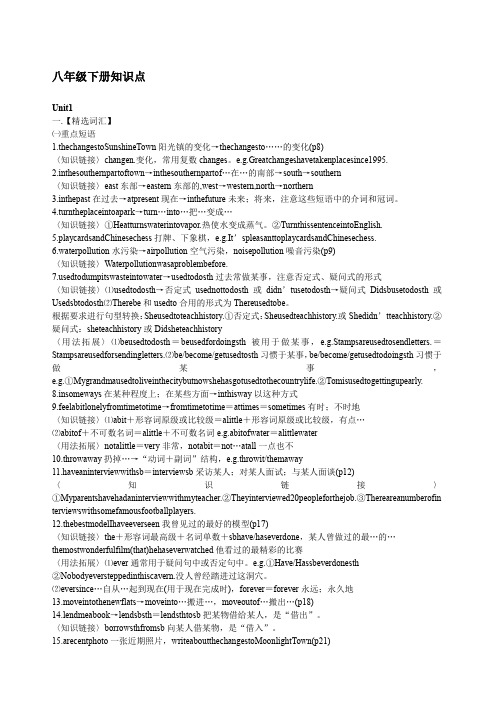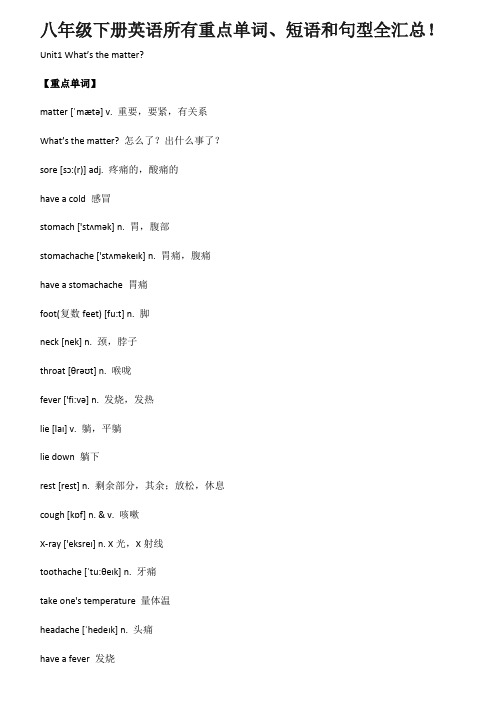八年级下册所有重点单词、短语和句型全汇总
八下英语短语总结归纳1-10单元

八下英语短语总结归纳1-10单元1. Unit 1: Daily routine- get up: to wake up and get out of bed- have breakfast: to eat the first meal of the day- brush teeth: to clean teeth with a toothbrush- go to school: to attend classes at a school- do homework: to complete school assignments at home- go to bed: to get into bed to sleep- take a shower: to clean the body by using water and soap- have lunch: to eat the midday meal- go shopping: to buy things at stores- watch TV: to view television programs2. Unit 2: Health and fitness- play sports: to engage in physical activities, often in a competitive manner- eat healthy: to consume food that is good for one's overall well-being- do exercise: to perform physical activities to improve fitness or strength- stay active: to maintain an active lifestyle or engage in regular physical activities- get enough sleep: to have an adequate amount of sleep- drink plenty of water: to consume a sufficient amount of water for hydration- eat a balanced diet: to consume a variety of foods that provide all the necessary nutrients- reduce stress: to find ways to relax and minimize mental or emotional stress- maintain a healthy weight: to keep a body weight within a healthyrange for one's height and body type- avoid smoking: to refrain from the habit of smoking cigarettes or using tobacco-related products3. Unit 3: Food and drinks- have a meal: to eat a specific amount of food for a particular time - order takeout: to request food from a restaurant to be prepared for pickup or delivery- cook a meal: to prepare food for consumption- drink milk: to consume the liquid produced by mammals that is high in calcium and other nutrients- eat fast food: to consume food that is quickly prepared and served - have a snack: to eat a small amount of food between regular meals- drink tea: to consume a hot or cold beverage made from the Camellia sinensis plant- taste delicious: to have a pleasant or savory flavor- try new foods: to sample or experience different types of cuisine - consume in moderation: to consume food or drinks in appropriate or limited quantities4. Unit 4: School life- attend classes: to be present in a classroom or lecture hall for educational purposes- take notes: to write down important information during a class or lecture- participate in activities: to engage or join in events or tasks- complete assignments: to finish tasks or projects given by teachers- study for exams: to prepare or review content in order to performwell on tests- ask questions: to seek clarification or further information on a topic- join clubs: to become a member of extracurricular groups or organizations- do group projects: to work collaboratively with other students on assigned tasks- pass exams: to achieve a satisfactory result on a test or examination- attend school events: to be present at special activities or gatherings organized by the school5. Unit 5: Hobbies and interests- play musical instruments: to produce music by using devices designed to create sound- read books: to look at written or printed materials to obtain information or for leisure- watch movies: to view motion pictures for entertainment or educational purposes- listen to music: to pay attention to sound produced by instruments or voices- draw pictures: to create images with pencils, pens, or other artistic mediums- take photographs: to capture images using a camera- play video games: to engage in electronic games played on a computer or gaming console- collect stamps: to gather or accumulate postage stamps as a hobby- dance to music: to move rhythmically to music in a choreographed manner- write stories: to create narratives or fictional accounts on paper or electronically6. Unit 6: Environmental protection- reduce waste: to decrease the amount of trash or garbage produced- recycle materials: to convert used items into new products- save water: to avoid wasting or using excessive amounts of water - plant trees: to put a tree or seed into the ground for growth- turn off lights: to switch off electrical illumination- conserve energy: to use energy resources efficiently and prevent unnecessary consumption- protect wildlife: to take measures to ensure the safety and well-being of animals in their natural habitats- use public transport: to utilize modes of transportation available to the general public, such as buses or trains- go green: to adopt environmentally-friendly practices or choices - be aware of pollution: to be mindful of the presence of harmful substances in the environment7. Unit 7: My neighborhood- go for a walk: to take a leisurely stroll in the neighborhood or local area- visit friends: to go to someone's place of residence or meet up for social purposes- go to the park: to visit a designated outdoor area for recreation or relaxation- go shopping: to visit stores or markets for the purpose of purchasing goods or services- explore the city: to traverse and discover different parts of theurban area- attend community events: to participate in activities organized for the residents of the local area- visit cultural sites: to go to places that hold historical, artistic, or cultural significance- use public facilities: to utilize amenities or services provided by the government for public use- make new friends: to establish connections with individuals who were previously unknown- respect neighbors: to treat those living in close proximity with consideration and courtesy8. Unit 8: Travel and vacations- go on a trip: to embark on a journey for leisure or business purposes- visit tourist attractions: to go to places that are popular among visitors for their unique features or significance- take photos: to capture moments or sights using a camera or mobile device- enjoy the scenery: to appreciate and find pleasure in the natural or manmade views- taste local cuisine: to sample or experience the traditional or characteristic food of a specific region or country- go sightseeing: to go around and look at interesting or notable places- stay at a hotel: to lodge or reside temporarily in an establishment providing accommodation services- learn about different cultures: to gain knowledge or understanding of customs, traditions, and practices of diverse societies- relax on the beach: to rest or unwind near the shoreline of the ocean or lake- go hiking: to take long walks or treks in natural environments, usually involving challenging terrains9. Unit 9: Festivals and celebrations- celebrate birthdays: to observe the anniversary of one's birth- have a party: to organize a gathering of people for enjoyment or celebration- exchange gifts: to give and receive presents as a gesture of goodwill- set off fireworks: to ignite explosives that produce colorful displays in the sky- wear traditional clothes: to dress in garments associated with specific cultures or traditions- enjoy festive food: to indulge in special dishes prepared during specific celebrations- attend ceremonies: to be present at formal events conducted for specific purposes- decorate homes: to adorn living spaces with ornaments or embellishments for the celebration- sing festive songs: to perform or engage in vocal melodies associated with a particular occasion- observe religious rituals: to partake in prescribed practices related to a religious belief or faith10. Unit 10: Science and technology- use computers: to operate electronic devices capable of performing various functions- surf the internet: to browse or navigate the world wide web forinformation or entertainment- send emails: to transmit electronic messages through the internet - do online research: to explore and gather information using digital resources- download apps: to obtain and install applications on mobile devices or computers- watch online videos: to view visual content available on the internet- use social media: to engage or interact with others through online platforms- stay connected: to maintain communication or contact, especially through digital means- make video calls: to communicate with others using video and audio in real-time- stay updated with technology: to keep abreast of the latest advancements and developments in the field of technology。
(完整版)人教版英语八年级下册重点词组、句型及语法点汇总,推荐文档

13.be back 回来14.be angry with sb 生某人的气15.throw down 扔下16.the minute=as soon as 一…就…e over 过来18.sit down 坐下19.take sb. for a walk 带某人去散步20.all the time 频繁;反复21.all day / evening 整日/夜22.shout back 大声回应23.walk away 走开24.in surprise 惊讶地25.share the housework 分担家务26.hang out 闲逛27.do chores 做杂务28.go to the store 去商店29.buy drinks and snacks 买饮料和点心30.make sb. do sth. 使某人做某事31.have enough stress from 有来自…足够的压力32.a waste of time 浪费时间33.in order to 为了34.get good grades 取得好成绩35.depend on 依赖;依靠36.have no idea 不知道37.develop children’s independence 发展孩子独立性38.look after=take care of 照顾;照看39.as a result 结果40.agree with sb 同意某人的观点/意见disagree with sb 不同意某人的观点/意见二、常见搭配1.finish doing sth. 完成做某事2.a few “几个”,后接可数名词复数few “很少,几乎没有”,后接可数名词复数a little “一点儿”,后接不可数名词little “很少,几乎没有”,后接不可数名词3.1> question “问题”,需要回答的问题,与ask或answer 搭配2> problem “问题”,需要解决的问题,与solve 搭配in the front of “在…前面”,在所说范围之内5.as…as… “与…一样…”,中间加形容词或副词原级,。
牛津译林版八年级英语下册全册词汇、句型、语法知识点及训练汇总

牛津译林版八年级英语下册Unit 1 Past and present词汇、句型、语法知识点及训练知识精讲一、必背词汇past n. 过去adj.过去的present n. 现在,目前just adv. 刚才since conj. 自……以来prep.自……以来ever adv. 曾经northern adj. 北方,北部的married adj. 已婚的,结婚的wife n.(pl. wives) 妻子block n.街区over prep. 在……期间pollution n. 污染;污染物factory n. 工厂waste n. 废料;废品realize (= realise )vt.& vi.意识到;实现improve vt.&vi. 改进,改善situation n. 形势,情况impossible adj. 不可能的before adv.以前,过去lonely adj. 孤独的,寂寞的anyway adv. 尽管,即使这样husband n. 丈夫interview n. 采访;会见yet adv. 还,仍recently adv.近来,最近environment n. 环境transport n.交通车辆,运输工具condition n. 环境,条件,状况return vi. 返回last adv.最近,上一次;最后abroad adv. 到(在)国外primary adj. 小学教育的;初级的communicate vt. &vi. 交流,交际exactly adv.(答语)正是,没错narrow adj. 狭窄的二、重点词汇1. present noun /ˈprez.ənt/1). something that you are given, without asking for it, on a special occasion, especially to showfriendship, or to say thank you(尤指表示友谊或致谢的)礼物,赠品例句:They gave me theatre tickets as a present.他们送给我戏票作为礼物。
八年级英语下册知识点汇总

八年级英语下册知识点汇总
1. 词汇知识:
- 常见动词的过去式和过去分词形式,如regular verbs, irregular verbs等。
- 常见名词、形容词、副词等词性及其用法。
- 常见短语和表达方式,如常用的时间短语、交际用语等。
2. 语法知识:
- 时态:一般过去时、过去进行时、过去完成时等。
- 语态:被动语态的构成和用法。
- 直接引语和间接引语的转换。
- 条件句的构成和用法,如if条件句等。
- 定语从句和状语从句的构成和用法。
3. 阅读理解:
- 阅读短文,理解其主旨和关键信息。
- 根据上下文猜测词义。
- 根据问题找出文中相应的答案。
4. 写作技巧:
- 书面表达:写信、写作文等。
- 口头表达:进行简短的演讲、对话等。
- 语法和拼写的正确应用。
5. 听力技巧:
- 听取关键信息,如对话中的时间、地点、人物等。
- 根据对话内容回答问题。
- 培养对不同语速和语调的听力理解能力。
以上是八年级英语下册的主要知识点汇总,希望对你的学习有所帮助!。
八下英语重点单词短语

八下英语重点单词短语八年级英语的重点单词和短语有很多。
下面是一些可能的例子: 1. 单词:Adventure(冒险)。
Ancient(古代的)。
Behavior(行为)。
Climate(气候)。
Environment(环境)。
Global(全球的)。
Heritage(遗产)。
Journey(旅程)。
Knowledge(知识)。
Pollution(污染)。
Species(物种)。
Tradition(传统)。
Urban(城市的)。
Wildlife(野生动物)。
2. 短语:A piece of cake(小菜一碟)。
Break the ice(打破僵局)。
Catch someone's eye(引起某人的注意)。
Don't judge a book by its cover(不要以貌取人)。
Get the hang of(掌握)。
In the long run(从长远来看)。
It's a small world(世界真小)。
Keep an eye on(密切关注)。
On top of the world(兴高采烈)。
Piece of advice(一条建议)。
Take it easy(放松点)。
Think outside the box(打破常规思维)。
Turn a blind eye to(对...视而不见)。
Worth a shot(值得一试)。
以上只是一些八年级英语的重点单词和短语的例子,实际上还有很多其他的词汇和短语。
希望这些例子能对你有所帮助。
新目标八年级下册英语各单元重点语法汇总

新目标八年级下册英语各单元重点语法汇总一. 询问健康及麻烦的表达方法1. 常用结构:What’s the matter (with sb.)?(sb.)怎么了?What’s wrong (with sb.)?(sb.)怎么了?What’s the trouble with sb? sb.出什么事了?What happened to sb? sb.发生了什么事?Are you OK? 你没事吧?Is there anything wrong with sb.?sb.有不舒服/麻烦吗?2. 要表达身体疼痛或不舒服,可用以下结构:①sb. have/has 病症The twins have colds.双胞胎感冒了。
②sb.have/has a headache/toothache/stomachache/backache. She had a stomachache last night. 她昨晚肚子痛。
③sb. have/has a sore 发病部位He has a sore throat. 他喉咙痛。
④sb. hurt(s) 身体部位或反身代词He hurt his leg. 他的腿受伤了。
⑤某部位hurt(s).My head hurts badly. 我头痛得厉害。
⑥sb. have/has a pain in one’s 身体部位I have a pain in my chest. 我胸口痛。
⑦(There is) something wrong with one’s 身体部位There is something wrong with my right eye. 我的右眼有毛病。
⑧其他表达方式She has a heart trouble. 她有心脏病。
He got hit on the head. 他头部受到了撞击。
She cut her finger. 她割破手指了。
二.情态动词should1. should为情态动词,意为“应该;应当”,否定式为shouldn’t,其后接动词原形,无人称和数的变化。
牛津英语八年级下册知识点梳理汇总

八年级下册知识点Unit1一.【精选词汇】㈠重点短语1.thechangestoSunshineTown阳光镇的变化→thechangesto……的变化(p8)〈知识链接〉changen.变化,常用复数changes。
e.g.Greatchangeshavetakenplacesince1995.2.inthesouthernpartoftown→inthesouthernpartof…在…的南部→south→southern〈知识链接〉east东部→eastern东部的,west→western,north→northern3.inthepast在过去→atpresent现在→inthefuture未来;将来,注意这些短语中的介词和冠词。
4.turntheplaceintoapark→turn…into…把…变成…〈知识链接〉①Heatturnswaterintovapor.热使水变成蒸气。
②TurnthissentenceintoEnglish.5.playcardsandChinesechess打牌、下象棋,e.g.It’spleasanttoplaycardsandChinesechess.6.waterpollution水污染→airpollution空气污染,noisepollution噪音污染(p9)〈知识链接〉Waterpollutionwasaproblembefore.edtodumpitswasteintowater→usedtodosth过去常做某事,注意否定式、疑问式的形式〈知识链接〉⑴usedtodosth→否定式usednottodosth或didn’tusetodosth→疑问式Didsbusetodosth或Usedsbtodosth⑵Therebe和usedto合用的形式为Thereusedtobe。
根据要求进行句型转换:Sheusedtoteachhistory.①否定式:Sheusedteachhistory.或Shedidn’tteachhistory.②疑问式:sheteachhistory或Didsheteachhistory〈用法拓展〉⑴beusedtodosth=beusedfordoingsth被用于做某事,e.g.Stampsareusedtosendletters.=Stampsareusedforsendingletters.⑵be/become/getusedtosth习惯于某事,be/become/getusedtodoingsth习惯于做某事,e.g.①Mygrandmausedtoliveinthecitybutnowshehasgotusedtothecountrylife.②Tomisusedtogettingupearly.8.insomeways在某种程度上;在某些方面→inthisway以这种方式9.feelabitlonelyfromtimetotime→fromtimetotime=attimes=sometimes有时;不时地〈知识链接〉⑴abit+形容词原级或比较级=alittle+形容词原级或比较级,有点…⑵abitof+不可数名词=alittle+不可数名词e.g.abitofwater=alittlewater〈用法拓展〉notalittle=very非常,notabit=not…atall一点也不10.throwaway扔掉…→“动词+副词”结构,e.g.throwit/themaway11.haveaninterviewwithsb=interviewsb采访某人;对某人面试;与某人面谈(p12)〈知识链接〉①Myparentshavehadaninterviewwithmyteacher.②Theyinterviewed20peopleforthejob.③Thereareanumberofin terviewswithsomefamousfootballplayers.12.thebestmodelIhaveeverseen我曾见过的最好的模型(p17)〈知识链接〉the+形容词最高级+名词单数+sbhave/haseverdone,某人曾做过的最…的…themostwonderfulfilm(that)hehaseverwatched他看过的最精彩的比赛〈用法拓展〉⑴ever通常用于疑问句中或否定句中。
八年级下册英语单词、短语句型

八年级下册英语所有重点单词、短语和句型全汇总!Unit1 What’s the matter?【重点单词】matter [ˈmætə] v. 重要,要紧,有关系What’s the matter? 怎么了?出什么事了?sore [sɔ:(r)] adj. 疼痛的,酸痛的have a cold 感冒stomach ['stʌmək] n. 胃,腹部stomachache ['stʌməkeɪk] n. 胃痛,腹痛have a stomachache 胃痛foot(复数feet) [fu:t] n. 脚neck [nek] n. 颈,脖子throat [θrəʊt] n. 喉咙fever ['fi:və] n. 发烧,发热lie [laɪ] v. 躺,平躺lie down 躺下rest [rest] n. 剩余部分,其余;放松,休息cough [kɒf] n. & v. 咳嗽X-ray ['eksreɪ] n. X光,X射线toothache [ˈtu:θeɪk] n. 牙痛take one's temperature 量体温headache [ˈhedeɪk] n. 头痛have a fever 发烧break [breɪk] n. & v. 休息,暂停;打破take breaks (take a break)休息hurt [hə:t] v. 伤害,损害,使受伤passenger ['pæsɪndʒə] n. 乘客,旅客off [ɒf] adv. prep. 离开(某处);从…去掉get off 下车to one's surprise 使…惊讶,出乎…意料onto [ˈɒntə] prep. 向,朝trouble [ˈtrʌbl] n. 麻烦,烦扰,问题hit [hit] n. & v. 碰撞,打,打击right away 立即,马上get into 陷入,参与herself [hə:ˈself] pron. 她自己,她本身(she的反身代词)bandage ['bændɪdʒ] n. & v. 绷带;用绷带包扎sick [sɪk] adj. 患病的,不适的knee [ni:] n. 膝盖nosebleed [ˈnəʊzbli:d] n. 鼻出血breathe [bri:ð] v. 呼吸sunburned [ˈsʌnbɜ:nd] adj. 晒伤的ourselves [ɑ:ˈselvz] pron. 我们自己(we的反身代词)climber [ˈklaɪmə(r)] n. 登山者be used to 习惯于… 适应于…risk [rɪsk] n. & v. 风险,危险;冒险take risks (take a risk) 冒险accident [ˈæksidənt] n. 意外事件;事故situation [ˌsitjuˈeiʃən] n. 状况,形式,情况kg=kilogram [ˈkɪləgræm] n. 公斤,千克rock [rɔk] n. 岩石run out (of) 用尽,耗尽knife [naif] n. 刀,餐刀cut off 切除blood [blʌd] n. 血mean [mi:n] v. 意味着,意思是,意欲get out of 离开,从… 出来importance [ɪmˈpɔ:tns] n. 重要性decision [dɪ'sɪʒn] n. 决心,决定,抉择control [kən'trəʊl] v. 控制,支配,操纵be in control of 掌管,管理spirit ['spɪrɪt] n. 勇气,意志death [deθ] n. 死亡give up 放弃nurse [nə:s] n. 护士【重点短语】1.have a fever 发烧2.have a cough 咳嗽3.have a toothache 牙疼4.talk too much 说得太多5.drink enough water 喝足够的水6.have a cold 受凉;感冒7.have a stomachache 胃疼8.have a sore back 背疼9.have a sore throat 喉咙痛10. take risks 冒险11.hot tea with honey 加蜂蜜的热茶12.see a dentist 看牙医13.get an X-ray 拍X 光片14.take one’ s temperature 量体温15.put some medicine on sth. 在……上面敷药16. give up 放弃17. sound like 听起来像18. all weekend 整个周末19. in the same way 以同样的方式20. go to a doctor 看医生21. go along 沿着……走22. on the side of the road 在马路边23. shout for help 大声呼救24. without thinking twice 没有多想25. get off 下车26. have a heart problem 有心脏病27. to one’ s surprise 另某人惊讶的是28. thanks to 多亏了;由于29. in time 及时30. make a decision 做出决定31. get into trouble 造成麻烦32. right away 立刻;马上33. because of 由于34. get out of 离开;从……出来35. keep on doing sth. 继续或坚持做某事36. put a bandage on sth. 用绷带包扎37. fall down 摔倒38. feel sick 感到恶心39. have a nosebleed 流鼻血40. cut his knee 割伤他的膝盖41. put her head back 把她的头向后仰42. have problems breathing 呼吸困难43. mountain climbing 登山运动44. be used to doing sth. 习惯做某事45. run out (of) 用完;用尽46. so that 以便47. so...that... 如此……以至于...…48. be in control of 掌管;管理49. in a difficult situation 在闲境中【重点句型】1. What's the matter with you?= What'the trouble with you?= What's wrong with you? 你怎么了?2. What should she do? 她该怎么办呢?3.Should I take my temperature? 我应该量一下体温吗?4.You should lie down and rest. 你应该躺下休息一会儿。
- 1、下载文档前请自行甄别文档内容的完整性,平台不提供额外的编辑、内容补充、找答案等附加服务。
- 2、"仅部分预览"的文档,不可在线预览部分如存在完整性等问题,可反馈申请退款(可完整预览的文档不适用该条件!)。
- 3、如文档侵犯您的权益,请联系客服反馈,我们会尽快为您处理(人工客服工作时间:9:00-18:30)。
八年级下册所有重点单词、短语和句型全汇总Unit1 What’s the matter?【重点单词】matter [?m?t?] v. 重要,要紧,有关系What’s the matter? 怎么了?出什么事了?sore [s?:(r)] adj. 疼痛的,酸痛的have a cold 感冒stomach ['st?m?k] n. 胃,腹部stomachache ['st?m?ke?k] n. 胃痛,腹痛have a stomachache 胃痛foot(复数feet) [fu:t] n. 脚neck [nek] n. 颈,脖子throat [θr??t] n. 喉咙fever ['fi:v?] n. 发烧,发热lie [la?] v. 躺,平躺lie down 躺下rest [rest] n. 剩余部分,其余;放松,休息cough [k?f] n. & v. 咳嗽X-ray ['eksre?] n. X光,X射线toothache [?tu:θe?k] n. 牙痛take one's temperature 量体温headache [?hede?k] n. 头痛have a fever 发烧break [bre?k] n. & v. 休息,暂停;打破take breaks (take a break)休息hurt [h?:t] v. 伤害,损害,使受伤passenger ['p?s?nd??] n. 乘客,旅客off [?f] adv. prep. 离开(某处);从…去掉get off 下车to one's surprise 使…惊讶,出乎…意料onto [??nt?] prep. 向,朝trouble [?tr?bl] n. 麻烦,烦扰,问题hit [hit] n. & v. 碰撞,打,打击right away 立即,马上get into 陷入,参与herself [h?:?self] pron. 她自己,她本身(she的反身代词)bandage ['b?nd?d?] n. & v. 绷带;用绷带包扎sick [s?k] adj. 患病的,不适的knee [ni:] n. 膝盖nosebleed [?n??zbli:d] n. 鼻出血breathe [bri:e] v. 呼吸sunburned [?s?nb?:nd] adj. 晒伤的ourselves [ɑ:?selvz] pron. 我们自己(we的反身代词)climber [?kla?m?(r)] n. 登山者be used to 习惯于…适应于…risk [r?sk] n. & v. 风险,危险;冒险take risks (take a risk) 冒险accident [??ksid?nt] n. 意外事件;事故situation [?sitju?ei??n] n. 状况,形式,情况kg=kilogram [?k?l?gr?m] n. 公斤,千克rock [r?k] n. 岩石run out (of) 用尽,耗尽knife [naif] n. 刀,餐刀cut off 切除blood [bl?d] n. 血mean [mi:n] v. 意味着,意思是,意欲get out of 离开,从…出来importance [?m?p?:tns] n. 重要性decision [d?'s??n] n. 决心,决定,抉择control [k?n'tr??l] v. 控制,支配,操纵be in control of 掌管,管理spirit ['sp?r?t] n. 勇气,意志death [deθ] n. 死亡give up 放弃nurse [n?:s] n. 护士【重点短语】1.have a fever 发烧2.have a cough 咳嗽3.have a toothache 牙疼4.talk too much 说得太多5.drink enough water 喝足够的水6.have a cold 受凉;感冒7.have a stomachache 胃疼8.have a sore back 背疼9.have a sore throat 喉咙痛10. take risks 冒险11.hot tea with honey 加蜂蜜的热茶12.see a dentist 看牙医13.get an X-ray 拍X 光片14.take one’s temperature 量体温15.put some medicine on sth. 在……上面敷药16. give up 放弃17. sound like 听起来像18. all weekend 整个周末19. in the same way 以同样的方式20. go to a doctor 看医生21. go along 沿着……走22. on the side of the road 在马路边23. shout for help 大声呼救24. without thinking twice 没有多想25. get off 下车26. have a heart problem 有心脏病27. to one’s surprise 另某人惊讶的是28. thanks to 多亏了;由于29. in time 及时30. make a decision 做出决定31. get into trouble 造成麻烦32. right away 立刻;马上33. because of 由于34. get out of 离开;从……出来35. keep on doing sth. 继续或坚持做某事36. put a bandage on sth. 用绷带包扎37. fall down 摔倒38. feel sick 感到恶心39. have a nosebleed 流鼻血40. cut his knee 割伤他的膝盖41. put her head back 把她的头向后仰42. have problems breathing 呼吸困难43. mountain climbing 登山运动44. be used to doing sth. 习惯做某事45. run out (of) 用完;用尽46. so that 以便47. so...that... 如此……以至于...…48. be in control of 掌管;管理49. in a difficult situation 在闲境中【重点句型】1. What's the matter with you?= What'the trouble with you?= What's wrong with you? 你怎么了?2. What should she do? 她该怎么办呢?3.Should I take my temperature? 我应该量一下体温吗?4.You should lie down and rest. 你应该躺下休息一会儿。
5. Do you think it comes from a newspaper or a book? 你认为它是来自报纸还是书呢?6. I think I sat in the same way for too long without moving.我想我以同样的姿势一动不动地坐得太久了。
7. She said that the man had a heart problem and should go to the hospital. 她说这个人有心脏病应该去医院。
Unit2 I’ll help to clean up the city parks.【重点单词】clean up 打扫(清除)干净cheer [t?i?] v. 欢呼cheer up 变得更高兴,振奋起来give out 分发,散发volunteer [?v?l?n?ti?] n. & v. 志愿者;义务做come up with 想出,提出put off 推迟sign [sa?n] n. 标记,符号,标牌notice [?n??t?s] n. & v. 通知,公告;注意到hand out 分发call up 打电话给…某人,征召used to do sth. 过去常常做某事lonely ['l??nl?] adj. 孤独的,寂寞的care for 照顾,非常喜欢several [?sevr?l] prep. 几个,数个,一些strong [str??] adj. 强壮的,强烈的feeling [?fi:l??] n. 感觉,感触satisfaction [?s?t?s'f?k?n] n. 满足,满意joy [d???] n. 高兴,愉快owner [???n?(r)] n. 所有者,物主try out 参加…选拔,试用journey ['d??:n?] n. (尤指长途)旅行,行程raise [re?z] v. 抬起,举起,筹集,征集alone [??l?un] adv. 独自地,孤独地repair [ri?p??] v. 修理,修补fix [fiks] v. 修理,安装fix up 修理,修补give away 赠送,捐赠take after (外貌或行为)像broken ['br??k?n] adj. 破损的,残缺的wheel [wi:l] n. & v. 轮子,车轮;旋转letter [?let?] n. 信件,字母Miss [m?s] n. 小姐set up 建立,设立disabled [dis?eib?ld] adj. 有残疾的,丧失能力的make a difference 影响,有作用blind [bla?nd] adj. 盲的,盲目的,失明的deaf [def] adj. 聋的imagine [??m?d??n] v. 想象,设想difficulty ['d?f?k?lt?] n. 困难open [???p?n] v. 打开door [d?:] n. 门carry ['k?r?] v. 携带,搬运train [tre?n] v. 训练,培养training [?tre?n??] n. 训练,培训excited [?k?sa?t?d] adj. 激动的,兴奋的kindness [?ka?ndn?s] n. 仁慈,善良,亲切,善意clever [?klev?] adj. 聪明的,机灵的understand [??nd??st?nd] v. 懂,理解change [t?e?nd?] n. & v. 改变interest ['?ntr?st] n. & v. 感兴趣;兴趣sir [s?:(r)] n. 先生madam ['m?d?m] n. 夫人,女士【重点短语】1.Clean-Up Day 清洁日2. an old people’s home 养老院3. help out with sth. 帮助解决困难4. used to 过去常常......5. care for 关心;照顾6. the look of joy 快乐的表情7. at the age of 在......岁时8.clean up 打扫(或清除)干净9. cheer up (使)变得更高兴;振奋10. give out 分发;散发11. come up with 想出;提出12. make a plan 制订计划13. make some notices 做些公告牌14. try out 试用;试行15. work for 为…工作;为…. 效力16. put up 建造;举起;张贴17. hand out 分发;散发;发给18. call up 打电话;召集19. put off 推迟;延迟20. for example 比如;例如21. raise money 筹钱;募捐22. take after 与......相像;像23. give away 赠送;捐赠24. fix up 修理;修补;解决25. be similar to 与……相似26. set up 建立;设立27. disabled people 残疾人28. make a difference 影响;有作用29. be able to 能够30. after-school reading program 课外阅读项目【重点句型】1. The boy could give out food at the food bank. 这个男孩可以在食品救济站分发食物。
